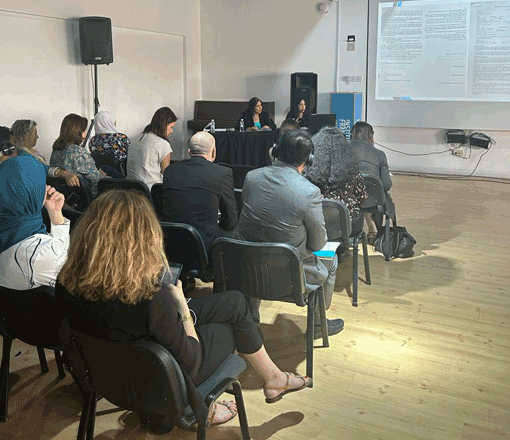You are here
Panel discussion examines challenges related to domestic workers’ unified contracts
By Maria Weldali - Jun 08,2023 - Last updated at Jun 08,2023

Participants during a panel discussion organised by the Jordanian NGO Tamkeen for Legal Aid and Human Rights, in cooperation with the French embassy in Jordan, in Amman on Thursday (Photo by Maria Weldali)
AMMAN — A panel discussion titled “The Unified Contract for Non-Jordanian Domestic Workers” on Thursday delved into the challenges related to domestic workers’ unified contracts.
Organised by the Jordanian NGO Tamkeen for Legal Aid and Human Rights, in cooperation with the French embassy in Jordan, the discussion brought together representatives from governmental agencies, civil society organisations, international NGOs and embassies.
The panel discussed ways in which an appropriate legislative environment could be developed, to support the rights of foreign workers, particularly domestic workers who are hired directly by a household.
The importance of social security and unified contracts for domestic workers was also addressed.
Placing in bold relief the dimensions of human trafficking, French Ambassador to Jordan Alexis le Cour Grandmaison, talked about the need to intensify efforts to combat human trafficking.
The ambassador, reaffirming his country’s full support of the cause, said: “Foreign workers and people living in unfavourable social conditions are among the most susceptible to human trafficking.”
The discussion came as part of a joint programme between Tamkeen and the French embassy in Jordan, aimed to strengthen the legal protection of human trafficking victims in Jordan.
Director of Tamkeen Linda Kalash said: “The responsibility is on all relevant parties. Governmental agencies should improve access to justice and civil society organisations’ role is to raise workers’ awareness of their rights.”
She added that the unified contract for the sector was introduced for the first time in the Kingdom back in 2006. However, until now, no instructions were issued under the migrant domestic worker regulation to adopt a unified contract for all domestic workers employed in Jordan.
Additionally, Kalash called for the need to extend labour standards and social protection to domestic workers in Jordan.
According to Tamkeen, “a unified contract is often a contract under which all workers in the sector fall under its umbrella, and is thus more comprehensive than a collective contract.”
Kalash pointed out that the unified contracts that are currently available are not identical, explaining that contracts are dispensed to each of the three parties with differing content.
Speaking during the discussion, insurance and social security expert Musa Al Sbeihi said: “Finding a solution should not be narrowed and other possible alternatives must not be hampered. Having a unified contract is not the only way to protect the rights of domestic workers.”
He argued that each and every country the Kingdom has signed a memorandum of understanding (MoU) with has different requirements, which makes it difficult to have a standardised contract. Sbeihi noted that some of these requirements might affect the national law.
Moreover, when talking about domestic workers the focus immediately shifts to female housekeepers, disregarding other domestic professions including gardeners and drivers who are also in need of assistance and protection, he said.
The number of non-Jordanian regular domestic workers according to the latest statistics issued by the Ministry of Labour, is 49,437 of which 49,163 are females and 274 are males of Filipino, Sri Lankan, Ethiopian, Ghanaian, Ugandan, Kenyan, Indonesian and Nepalese nationalities.
Moreover, the Labour Ministry’s website showed that Jordan has signed eight MoUs with the Philippines, Sri Lanka, Bangladesh, Indonesia, Ethiopia, Nepal and Uganda, outlining the countries’ cooperation relating to the recruitment of domestic workers from the aforementioned countries.
Following an in-depth analysis of these MoUs, Tamkeen revealed that all the MoUs called for having a unified and model contract specific for domestic works.
“These memorandums aim to regulate the contractual relationship between the worker and the employer to safeguard all parties’ rights and to clarify the respective roles of governments and recruitment offices in this process,” according to a Tamkeen statement sent to The Jordan Times on Thursday.
Related Articles
AMMAN — Twenty-nine suspected cases of human trafficking were referred to court this year, with the suspected crimes ranging from sexual exp
AMMAN — Jordan-based Tamkeen for Legal Aid and Human Rights has submitted 32 complaints by guest workers to the Public Security Department’s
AMMAN — A local organisation that works with migrant workers stated that it received over 730 complaints from domestic workers between the y














